Rural contractors: Wairarapa Weedsprayers
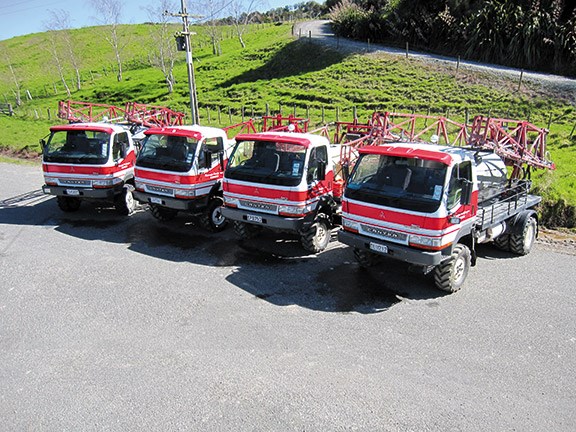 The Mitsubishi Canter fleet basking in the sun.
The Mitsubishi Canter fleet basking in the sun.

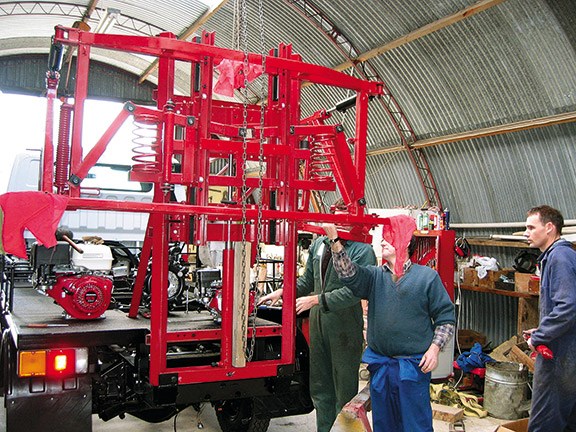 All modifications take place in the on-site workshop.
All modifications take place in the on-site workshop.

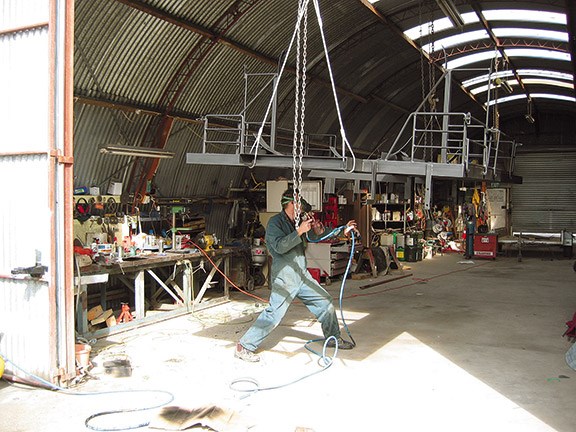 Clint spray-paints a new deck in the workshop.
Clint spray-paints a new deck in the workshop.

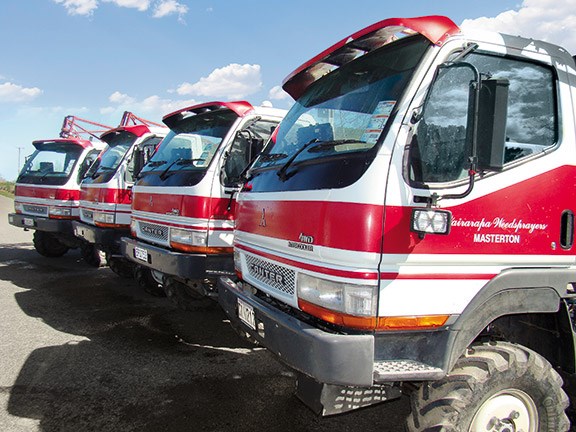

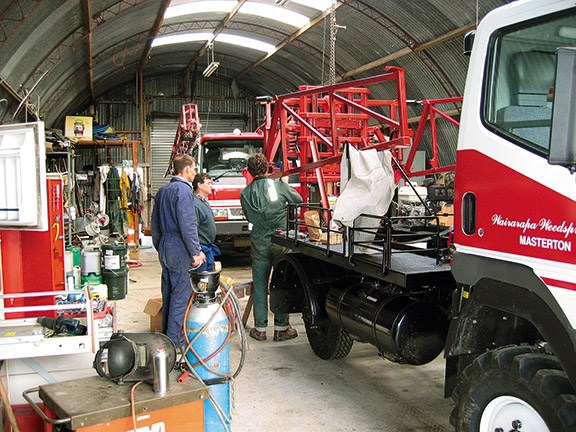

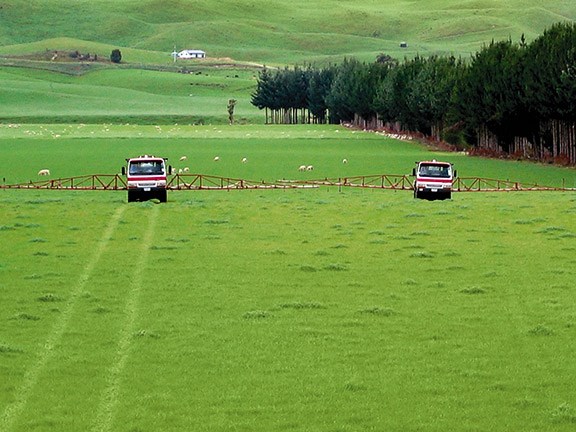 Side by side: two 18m booms spraying pasture.
Side by side: two 18m booms spraying pasture.

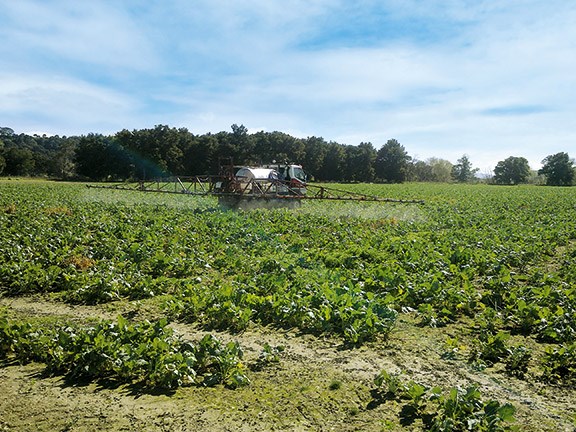

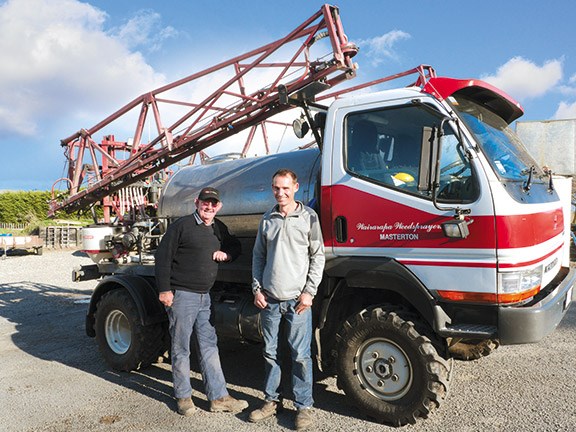 The guys in charge: Brendan (left) and Clint Carroll.
The guys in charge: Brendan (left) and Clint Carroll.

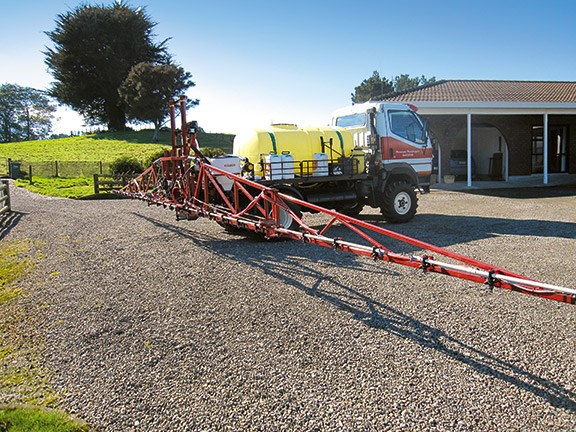


|
|
The Mitsubishi Canter fleet basking in the sun.
|

|
|
All modifications take place in the on-site workshop.
|

|
|
Clint spray-paints a new deck in the workshop.
|

|

|

|
|
Side by side: two 18m booms spraying pasture.
|

|

|
|
The guys in charge: Brendan (left) and Clint Carroll.
|

|
Assistant editor Rachel Middleton headed south to see how successful spraying is done in the Wairarapa.
Outside, the sun is shining but the wind is whistling. If the air were still, I may have missed out on the opportunity to talk to Brendan and Clint Carroll of Wairarapa Weedsprayers — they'd have been too busy working. As (my) luck would have it, Clint has just returned from the kids' Saturday morning sport and his mum and dad, Brendan and Robyn, are enjoying a cuppa at home in the hills of Gladstone.
Brendan is a proud life member of Rural Contractors New Zealand and a great believer in what the association stands for. The Carrolls see RCNZ as more than just a body to look after contractor interests. They see it as a valuable networking platform where members are able to swap ideas, experiences, and solutions to problems. And this is a huge benefit.
"It's great being able to pick the brains of other contractors who work in different environments," says Clint. "There's so much new gear out there that operators are experimenting with. Keeping on top of it all is priceless."
"Another benefit of being an RCNZ member is you're kept up to date with all the law changes surrounding your industry," says Brendan. "Honestly, most contractors don't have the time to be researching whatever the bureaucrats have decided is the latest necessity. RCNZ gives you the information clearly and concisely."
Wairarapa Weedsprayers started in 1979 with Brendan buying a one-man spraying business. From there, it's seen its ups and downs as the industry has flourished and floundered alongside the economy.
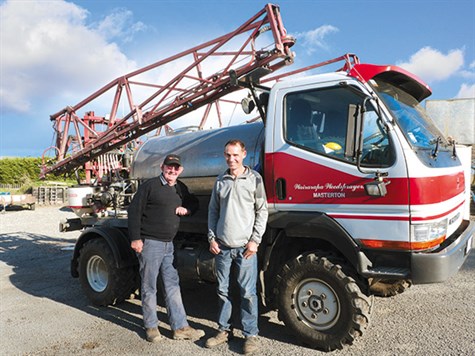
Brendan says he's seen a few big highs and lows over the years. "The 1998 drought was a big low, for instance. There was nothing green to spray." He and Robyn looked for other forms of income. "We ended up buying the (iconic) Gladstone pub and renovating that."
Clint joined the business in 1991, and like all smart contractors in seasonal work, split his year between the family business in the Wairarapa and Merredin, Western Australia. Fast forward to March this year and Clint is the majority shareholder in the business and is 100-percent responsible for the day-to-day running of the operation. Wairarapa Weedsprayers now employs six staff, including Robyn, who takes care of the administration.
The company sprays from Kahutara in the south to Homewood in the east, to Eketahuna in the north and the Tararuas in the west, and covers flat to steep land. It runs four boom-spray trucks that do the bulk of the work, all of them are Mitsubishi Canter 4x4s.
"We've two 18-metre booms and two 16-metres. The size used is determined by the area it's working in and the majority of our spraying takes place on rolling land," says Clint. "A 24-metre boom would be the go for consistently flat areas."
The trucks are brought in and modified on site. "It's much better if they're built by people who use them themselves. The guys selling these trucks usually don't drive them. We do all maintenance on site, which means any problems are a lot easier to fix," says Clint.
"I don't mind having too much gear," adds Brendan. "If it's sitting in the shed not being used, it's not being worn out. Trucks don't date like cars."
Chemical supply is also something Wairarapa Weedsprayers does itself. Clint says they supply 95 percent of their chemicals due to time-saving. "Too often, if the chemical is there when you turn up, there is not enough of it or it's not the right type, and this throws everything out," he says. "Also, by supplying it ourselves, we're able to only charge what we actually use."
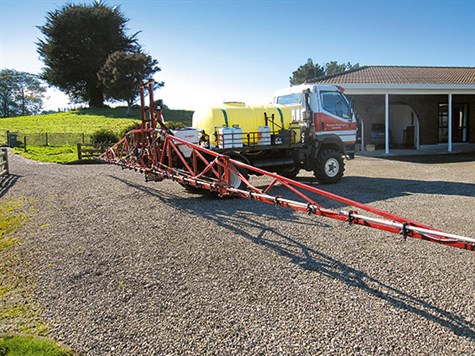
The guys have seen a rise in plantain and chicory and spraying has now become a more year-round operation. They still experience downtime in the winter but not to the extent of the trucks being in the shed for six months of the year.
Clint sees the planting of plantain and chicory as a step in the right direction for business growth. It requires a minimum of one spray per year but this is put into perspective when you understand the massive areas crops can go over.
When asked what has kept Brendan in the weedspraying game through the highs and lows, he doesn't hesitate: "The people and the sense of doing something positive for the community. Working for primary producers gives a real sense of satisfaction. We also have great customers and we build friendships with them."
"But it's not just clients – it's the other contractors as well. Many different people are involved in the lifecycle of a crop and we need to be able to communicate with each different branch of the industry effectively."
Wairarapa Weedsprayers has weathered a lot over the past 35 years. Looking to the future, Brendan and Clint see RCNZ and the contractor network, both in the Wairarapa and nationally, as integral to their growing success.
For the latest reviews of farm machinery, subscribe to Farm Trader magazine here.
Keep up to date in the industry by signing up to Farm Trader's free newsletter or liking us on Facebook



.jpg)



.jpg)
.jpg)
.jpg)

